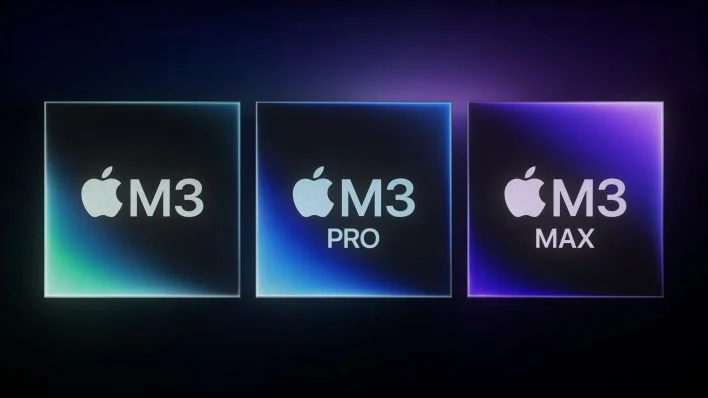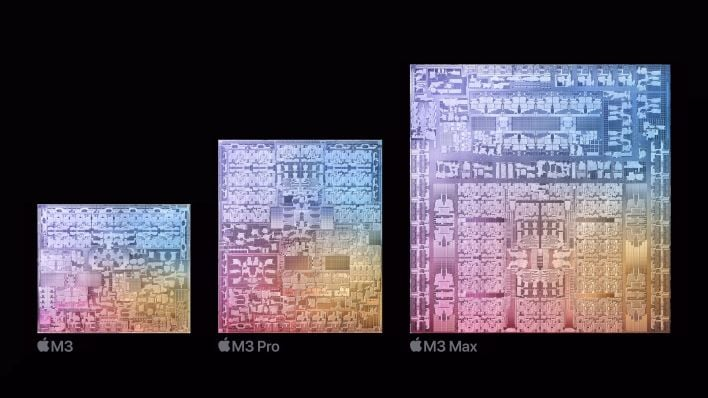Analyst Reports Apple’s M3 Tape-Out Cost Alone Was A Cool $1 Billion

Apple's brand-new M3 processors are due to arrive soon, to supplent their M2 predecessors, and according to semiconductor analyst Jay Goldberg taping out the new chips cost Cupertino a pretty penny. In fact, the total cost to get the three M3 chips to the manufacturing stage may have hit roughly $1 billion. If that's true, it means Apple is going to need to sell quite a few M3-powered Macs before it can recoup any real money.
The report came from the Digits to Dollars blog, run by Jay Goldberg, and much of it focuses on the economics of the M3 series. He estimates that it cost $1 billion for the entire M3 lineup to get taped-out, which refers to all of the work that went into designing the processors and preparing them for manufacture. Goldberg notes that despite these processors only being featured in Apple products, the company is able to justify spending as much as (or even more than) Intel or Qualcomm in R&D because Apple's margins are much better.

$1 billion however is not quite the total budget. To start with, manufacturing on TSMC's 3nm node is very expensive and definitely cuts into the margins of Apple's new chips, as is the case with any cutting-edge node. However, production might be even more expensive than usual if rumors about low yields on TSMC's 3nm process turn out to be correct. Low yields are a result of high defect rates, which leads to less efficient use of silicon. Additionally, larger CPUs (like the M3 Max) disproportionally suffer from lower yields, especially if the defect rate is relatively high.
It's also not clear if the $1 billion figure cited by Digits to Dollars assumes Apple only needed a single tape-out. Many CPUs require new steppings or versions in the event that performance is unexpectedly poor or if some kind of bug (or erratum) is encountered. While many modern processors have successfully launched with A0 silicon (which is literally the first tape-out) such as the RX 7900 XTX/XT for example, sometimes it doesn't always work out that well. A minor revision (like A1 or A2) wouldn't be so expensive, but a major revision (B0 or C0) would cost significantly more.
Whatever the specifics are, it's clear that Apple is spending tons of money on its latest processors, and the company is undoubtedly hoping its next-generation Mac laptops and desktops will more than make up for it.
The report came from the Digits to Dollars blog, run by Jay Goldberg, and much of it focuses on the economics of the M3 series. He estimates that it cost $1 billion for the entire M3 lineup to get taped-out, which refers to all of the work that went into designing the processors and preparing them for manufacture. Goldberg notes that despite these processors only being featured in Apple products, the company is able to justify spending as much as (or even more than) Intel or Qualcomm in R&D because Apple's margins are much better.

$1 billion however is not quite the total budget. To start with, manufacturing on TSMC's 3nm node is very expensive and definitely cuts into the margins of Apple's new chips, as is the case with any cutting-edge node. However, production might be even more expensive than usual if rumors about low yields on TSMC's 3nm process turn out to be correct. Low yields are a result of high defect rates, which leads to less efficient use of silicon. Additionally, larger CPUs (like the M3 Max) disproportionally suffer from lower yields, especially if the defect rate is relatively high.
It's also not clear if the $1 billion figure cited by Digits to Dollars assumes Apple only needed a single tape-out. Many CPUs require new steppings or versions in the event that performance is unexpectedly poor or if some kind of bug (or erratum) is encountered. While many modern processors have successfully launched with A0 silicon (which is literally the first tape-out) such as the RX 7900 XTX/XT for example, sometimes it doesn't always work out that well. A minor revision (like A1 or A2) wouldn't be so expensive, but a major revision (B0 or C0) would cost significantly more.
Whatever the specifics are, it's clear that Apple is spending tons of money on its latest processors, and the company is undoubtedly hoping its next-generation Mac laptops and desktops will more than make up for it.

